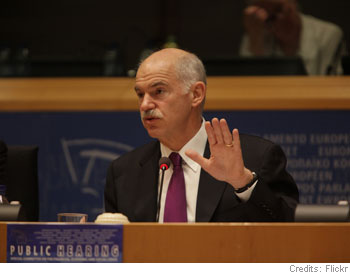 After warning yesterday officials in Brussels that Greece will be forced to turn to the IMF if European leaders fail to offer it a concrete financial aid package at the EU summit meeting on 25-26 March, Greek Prime Minister George Papandreou said Friday to the country’s biggest union, GSEE, that Greece was one step from being unable to borrow.
After warning yesterday officials in Brussels that Greece will be forced to turn to the IMF if European leaders fail to offer it a concrete financial aid package at the EU summit meeting on 25-26 March, Greek Prime Minister George Papandreou said Friday to the country’s biggest union, GSEE, that Greece was one step from being unable to borrow.
Reuters: “With full honesty towards Greeks, we talked about the point we have reached — one step from being unable to borrow,” he said. “We must avoid paying usurious interest for decades, condemning the country to a deep recession.”
The issue of aid for Greece and the indecision shown by several EU members to help eurozone’s weakest link with a concrete deal and a clear support mechanism is continuing to create uncertainty about Papandreou government’s austerity measures not having the necessary impact.
“We are in a state of war, in a battle against special interests, both at home and outside Greece,” he said. “It is a battle against speculators and for transparency, so that markets are at the service of the people, not the other way around.”
Greece wants the EU to come up with a concrete rescue plan in order to send a clear message to markets there would be no question of a debt default by Greece, as speculators had been heavily betting on. However, what seemed cut and dried at the beginning of the week is now by no means certain. Germany, the EU’s biggest economy and central to any EU support to Greece, seems increasingly reluctant to spend money on a bailout promise and is now saying that perhaps the IMF should come to the rescue of the country’s debt-laden economy.
Through measures such as freezing pensions, cutting civil service salaries, and slapping new taxes on goods such as cigarettes, alcohol, fuel, and precious gems, Greek officials are trying to convince investors that they can cut the nation’s budget deficit, which at 12.7% of GDP was the EU’s largest in 2009 and more than four times the 27-nation bloc’s limit.
Harvard University Professor Martin Feldstein has called the idea of Greece going from 12.7% deficit now to a 3% deficit two years from, “fantasy”.
- Bulenox: Get 45% to 91% OFF ... Use Discount Code: UNO
- Risk Our Money Not Yours | Get 50% to 90% OFF ... Use Discount Code: MMBVBKSM
Disclaimer: This page contains affiliate links. If you choose to make a purchase after clicking a link, we may receive a commission at no additional cost to you. Thank you for your support!


Leave a Reply